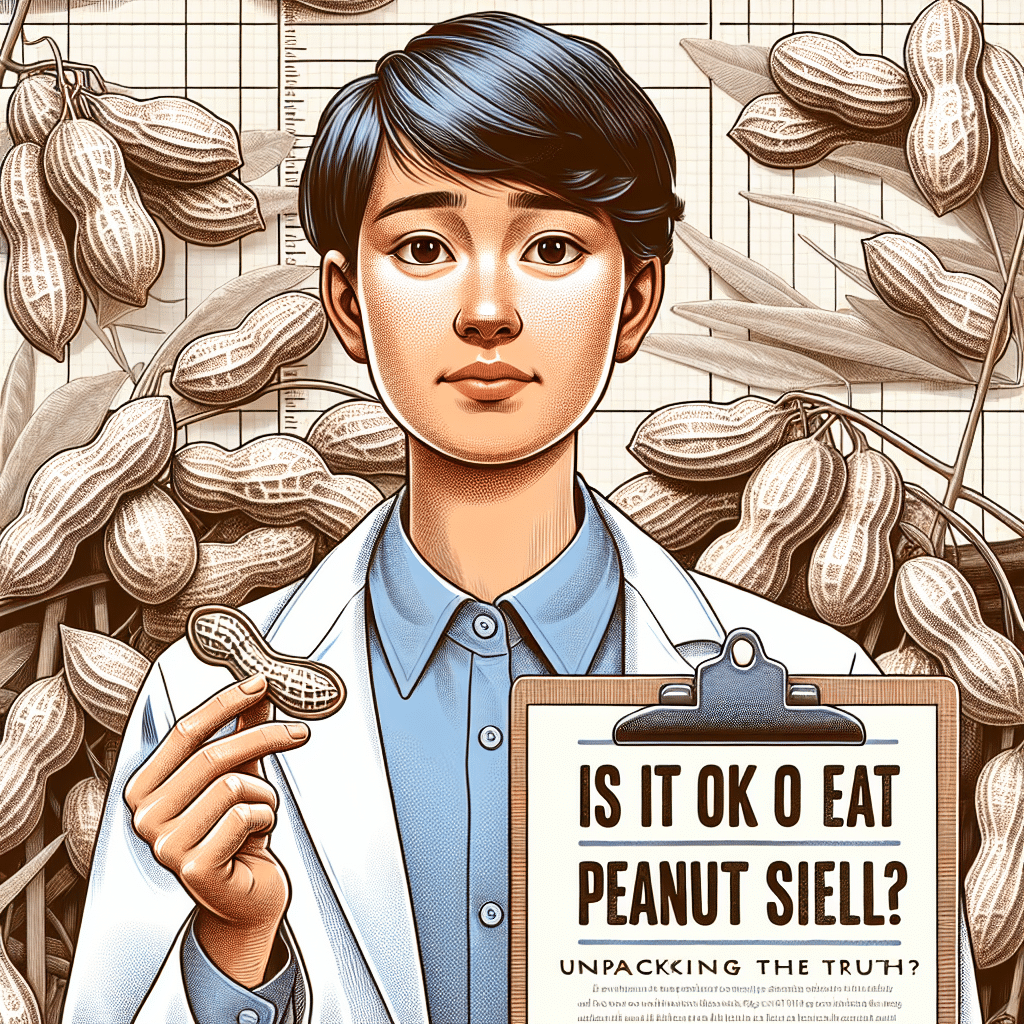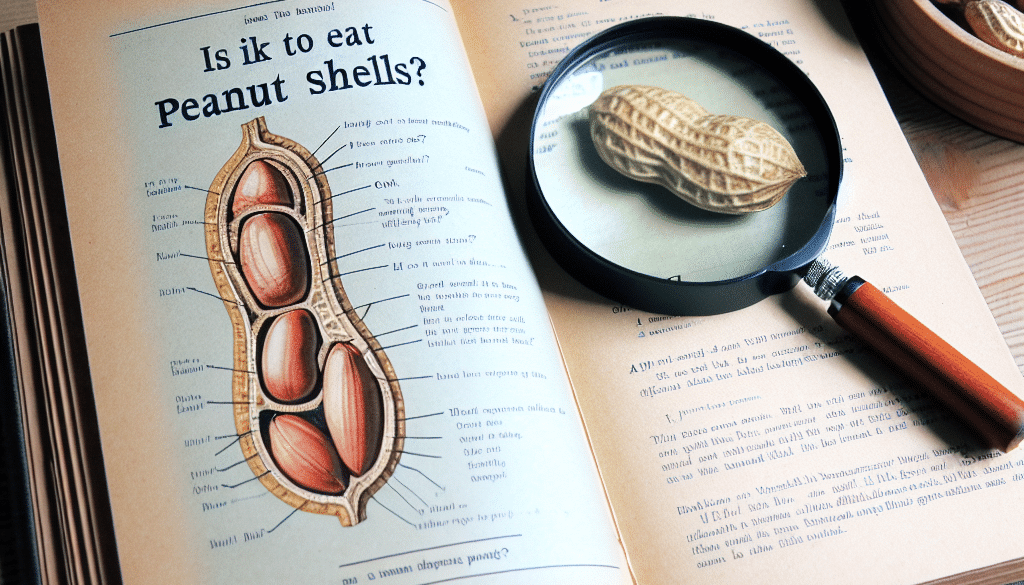Is It OK to Eat Peanut Shells? Unpacking The Truth
-
Table of Contents
- Eating Peanut Shells: Unpacking the Truth and Health Implications
- Understanding Peanut Shells
- Nutritional Profile of Peanut Shells
- Potential Health Benefits and Risks
- Are Peanut Shells Edible?
- Environmental and Ethical Considerations
- Alternatives to Eating Peanut Shells
- Conclusion: To Eat or Not to Eat Peanut Shells
- Discover ETprotein’s High-Quality Protein Products
Eating Peanut Shells: Unpacking the Truth and Health Implications

When it comes to snacking on peanuts, a common question that arises is whether it’s safe or even beneficial to eat the shells along with the nuts. While some might consider it an odd practice, others may have heard of potential health benefits or simply enjoy the crunchy texture. In this article, we delve into the facts about consuming peanut shells, examining the health implications, nutritional aspects, and potential risks associated with this unusual dietary choice.
Understanding Peanut Shells
Peanut shells, the fibrous outer covering that protects the edible seed inside, are composed primarily of cellulose, lignin, and a small amount of protein and fat. They are often considered agricultural waste and are used in various applications such as composting, animal feed, and even as a biofuel source. However, the question remains: are they fit for human consumption?
Nutritional Profile of Peanut Shells
At first glance, peanut shells might seem to offer some nutritional benefits. They are high in dietary fiber, which is essential for maintaining a healthy digestive system. However, the type of fiber in peanut shells is mostly non-soluble, which can be difficult for humans to digest. Moreover, the shells contain minimal amounts of vitamins and minerals, making them a poor substitute for more nutrient-dense food sources.
Potential Health Benefits and Risks
While the high fiber content in peanut shells could theoretically aid in digestion, the reality is more complex. The indigestible nature of the fiber could lead to gastrointestinal discomfort, including bloating, gas, and constipation. In some cases, it may even cause intestinal blockages, which can be a serious medical condition requiring prompt attention.
Furthermore, peanut shells can harbor contaminants and pesticides used during the farming process. These substances can pose health risks if ingested. Additionally, peanut shells may contain aflatoxins, toxic compounds produced by certain molds that can grow on peanuts and their shells, especially when stored in warm, humid conditions. Aflatoxins are known carcinogens and can lead to liver damage over time.
Are Peanut Shells Edible?
Technically, peanut shells are not toxic and can be consumed. However, just because something is non-toxic doesn’t mean it’s advisable to eat it. The human digestive system is not equipped to break down the tough fibers found in peanut shells effectively. As a result, eating them can lead to the aforementioned digestive issues and provide no significant nutritional gain.
Environmental and Ethical Considerations
Some might argue that eating peanut shells could reduce food waste and contribute to a more sustainable food system. While it’s true that minimizing waste is crucial for environmental conservation, there are more effective and safer ways to repurpose peanut shells without consuming them. For instance, they can be composted to enrich soil or used as livestock feed, where they can be digested more easily by certain animals.
Alternatives to Eating Peanut Shells
For those looking to increase their dietary fiber intake, there are numerous healthier and more palatable options available. Foods such as fruits, vegetables, whole grains, and legumes are all rich in both soluble and insoluble fibers and come with a host of other essential nutrients.
- Apples, bananas, oranges, and berries are excellent sources of soluble fiber.
- Leafy greens, root vegetables, and cruciferous vegetables like broccoli and Brussels sprouts provide insoluble fiber.
- Whole grains such as oats, barley, and brown rice are beneficial for overall digestive health.
- Beans, lentils, and chickpeas offer a combination of fiber, protein, and complex carbohydrates.
Conclusion: To Eat or Not to Eat Peanut Shells
In conclusion, while eating peanut shells is not inherently dangerous, it is not recommended due to the lack of nutritional benefits and the potential for digestive issues and exposure to harmful substances. There are far better dietary sources of fiber that are both safe and nutritious. It’s best to enjoy peanuts without their shells and explore other fiber-rich foods for a balanced diet.
Discover ETprotein’s High-Quality Protein Products
If you’re looking for nutritious protein options to complement your diet, consider ETprotein’s range of organic bulk vegan protein and plant proteins. Their products, including Organic rice protein, clear rice protein, pea protein, clear pea protein, pumpkin seed protein, sunflower seed protein, mung bean protein, and peanut protein, are non-GMO and allergen-free, making them a great choice for various dietary needs.
ETprotein caters to industries such as nutraceuticals, pharmaceuticals, cosmeceuticals, veterinary, and food and beverage. They are trusted by leading global brands and Fortune 500 companies, ensuring that you receive only the best quality products. For more information or to sample their products, reach out to ETprotein today.
About ETprotein:
ETprotein, a reputable protein Chinese factory manufacturer and supplier, is renowned for producing, stocking, exporting, and delivering the highest quality organic bulk vegan protein and plant proteins. They include Organic rice protein, clear rice protein, pea protein, clear pea protein, pumpkin seed protein, sunflower seed protein, mung bean protein, peanut protein etc. Their offerings, characterized by a neutral taste, non-GMO, allergen-free attributes, cater to a diverse range of industries. They serve nutraceutical, pharmaceutical, cosmeceutical, veterinary, as well as food and beverage finished product distributors, traders, and manufacturers across Europe, USA, Canada, Australia, Thailand, Japan, Korea, Brazil, and Chile, among others.
ETprotein specialization includes exporting and delivering tailor-made protein powder and finished nutritional supplements. Their extensive product range covers sectors like Food and Beverage, Sports Nutrition, Weight Management, Dietary Supplements, Health and Wellness Products, and Infant Formula, ensuring comprehensive solutions to meet all your protein needs.
As a trusted company by leading global food and beverage brands and Fortune 500 companies, ETprotein reinforces China’s reputation in the global arena. For more information or to sample their products, please contact them and email sales(at)ETprotein.com today.












